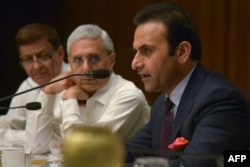A majority of presidential candidates in Afghanistan have demanded that President Ashraf Ghani either step down at the end of his tenure or withdraw his candidacy for the next election.
In a joint declaration issued Monday, 12 out of 18 candidates said the legal term for the current government ends on May 22 and unless Ghani decides to step out of the race, the only way forward is for a temporary government to carry out the elections.
The presidential elections were supposed to be held before the end of the current administration's five-year term, but have been postponed several times due to management and technical problems and lack of preparation by the election commission.
A few weeks ago, the country's Supreme Court allowed the current government to continue until the next polls, currently scheduled for September; however, fear of manipulation to influence the outcome is driving the candidates to demand an interim government.
"We have to find a way to bring everyone on the same page and ensure that no one is using the power or the authority of the government for winning," said Shaida Mohammad Abdali, a candidate who did not join the call for Ghani to step down.
"I see the risk of removing him from the palace in the current situation when we have a lot of political instability. ... If we insist on him leaving power, we will create chaos. Therefore, the option that he does not run will be an ideal situation," he said.
The presidential palace has rejected the demands, saying the current government will continue as directed by the highest court of the land.
Previous controversy
The last presidential elections were marred by controversy and allegations of massive vote rigging, leading to a stand-off between Ghani and chief rival Abdullah Abdullah. After a second round of voting did not yield a clear winner, the United States stepped in to broker a deal allowing Abdullah to share power as chief executive, a position that does not exist in the Afghan constitution.
Abdullah, who is also running in the coming elections, has announced his willingness to work with other candidates to design a mechanism to check the Unity Government so it does not use its authority for electoral gains.
U.S. role
A top U.S. official, Alice Wells, arrived in Afghanistan Sunday to launch a review of the civilian assistance program for Afghanistan and get an update on the elections.
A tweet from the U.S. embassy in Kabul said Wells "stressed the importance of a transparent, credible election process, of making swift preparations to complete voter registration, and hiring and training the staff needed to conduct elections in a timely manner" in her meeting with officials of Afghanistan's election commission.
An earlier statement from the embassy said Wells would meet with stakeholders of the Sept. 28 elections to learn about ongoing preparations and "underscore U.S. commitment to a transparent and efficient presidential elections process."
Surge in violence
Meanwhile, Afghanistan is witnessing a surge in violence that coincides with the Muslim holy month of Ramadan, according to the United Nations Assistance Mission in Afghanistan, or UNAMA. In a statement Monday, UNAMA voiced "grave concern" about the impact the violence had on civilians during the first week of Ramadan, which began last week.
Multiple back-to-back explosions rocked the city of Jalalabad in eastern Afghanistan on Monday, killing three people. So far, there has been no claim of responsibility. Last week, the Taliban attacked the Kabul offices of a nongovernmental organization, Counterpart International, and killed six people. The Taliban claimed the NGO was involved in spreading "Western activities" in Afghanistan.
The Taliban have rejected calls by Ghani and a recent loya jirga, or grand assembly, of more than 3,000 Afghans to announce a cease-fire during Ramadan. The insurgent group is demanding that all foreign troops leave the country. Even though the Taliban have engaged with Afghan stakeholders in the past, including opposition politicians, they refuse to have direct talks with official representatives of the Kabul government, labeling it a puppet of foreign occupiers.









